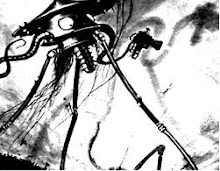Answers in Genesis Opens The Creation Museum
PZ Myers' blog post on this subject is a must read.
I haven't read all the way through, but I felt the need to comment on something that Myers hits on early in his post. Some newspapers feel the need to give both "sides" the same validity by reporting in a "he said/she said" fashion. An example from The New York Times:
For the skeptic the wonder is at a strange universe shaped by elaborate arguments, strong convictions and intermittent invocations of scientific principle. For the believer, it seems, this museum provides a kind of relief: Finally the world is being shown as it really is, without the distortions of secularism and natural selection.This kind of reporting is wide-spread across pretty much all subjects that journalists cover, and it's appalling. When something is blatantly false, a journalist shouldn't give those false claims the same weight as true claims -- yet, time and time again, journalists will do just that in order to appear "balanced." Not all topics are in dispute: some ideas and claims are demonstrably false, and it's a journalist's job to point that out.
But the quote above from the Times goes even beyond that kind of sloppy journalism. The quote appears to be giving more credibility to the false claims, considering that secularism and natural selection are described as "distortions" and that The Creation Museum is described as being "shaped by elaborate arguments, strong convictions and intermittent invocations of scientific principles." The reality couldn't be farther from the truth -- there's nothing scientific about The Creation Museum, there are no elaborate arguments, and the only strong convictions evident are those unsupported by empirical evidence.
All The Creation Museum has for visitors is a fistful of lies. Take a look for yourself, and read the response from the National Center for Science Education.



5 comments:
"Adam and Eve in Waterfall
...If you look close enough you will notice the forbidden fruit hanging temptingly over their heads, and the devilish snake twisted around a tree limb. Look closely, the snake's scales are made out of pumpkin seeds."
It's obvious that if the snake is made out of pumpkin seeds (wtf?!) that these people can't even take themselves seriously. And I'd like to know what fruit is hanging over their heads, because nowhere in the bible does it depict an actual fruit. (A pumpkin, perhaps? Or are they back to using the lame old apple again? I vote pumpkin if they haven't decided yet.)
And you hit on another problematic theme within the Adam and Eve story -- that there is something wrong about the exploration of knowledge. Why were they kicked out of paradise? For eating from the tree of knowledge, of which only god is allowed to partake. Doesn't that sound a awful lot like tyranny to anyone else?
I fail to see the tyranny in being given a paradise beyond anything we have today, with only one rule to follow.
I suppose any government that institutes even one law is tyrannical.
Adam and Eve ate the fruit out of a desire to be like God. A trait that humanity still carries today. Whether it is a new age view that we are all gods, or an atheistic view that refuses to accept the authority of a superior being.
Any system that denies knowledge to its people is tyranny. Systems that disrupt the flow of information are not democratic because democracy requires the free-flow of information in order for an informed citizenry to make sound decisions.
The Adam and Eve story uses symbolism to suggest that some knowledge should not be known to humans. At a philosophical level, this goes against everything the Enlightenment represents.
This is tyranny. Tyranny is defined as, "a rigorous condition imposed by some outside agency or force." That is exactly what god does in the Adam and Eve story -- god (an outside agency or force) has imposed a rigorous condition (no eating from the tree of knowledge) onto Adam and Eve.
The reason this is tyrannical and quite different from systems like the US Constitution is that Adam and Eve have no mechanism for recourse of action against the "law" mandated by god. They have no way to appeal this law, no way to debate it, no way to discuss it with those in a position of power (god), and no way to change it.
Any comparison to a democratically organized government, like the United States, is unwarranted because US citizens have the right to due process, have the right to petition, and have the right to a discourse with those in positions of power about the laws that govern them. And, most importantly, the US Constitution provides a mechanism to change laws. Laws are not set in stone.
This is why the god in the Adam and Eve story is tyrannical.
Post a Comment